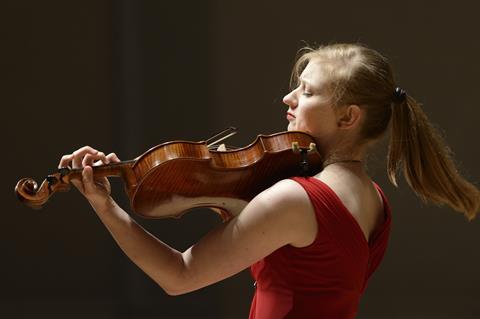The violist recalls the strategies that led to her victory in June 2015

The following is an extract from ‘Strategies for Success’, The Strad’s article on preparing for competitions, published in the September 2015 issue
The reason I enter competitions in general is to set myself a goal. I was at the Tokyo Competition in 2012, while I was studying with Nobuko Imai, because she realised I needed to have a goal to work towards and a deadline so that I could focus my energies. At that time I hadn’t found my own individual voice, and I knew that aiming for a set goal was the best way to do that.
In 2012 I didn’t progress to the final. Three years on, I wanted to show myself that I really had improved.From the moment I saw the list of repertoire on the competition website, I started to plan my year. If I had concerts coming up where the repertoire wasn’t yet finalised, I suggested some of the competition pieces, so I could focus as much of my practice time on them as possible. There were some works I hadn’t played before, which of course makes a difference; I prefer to get them under my fingers first, and then work on the interpretation. Scales, etudes and exercises remained as much a part of my practice regimen as ever: fingers need repetition and I’d be short-changing myself if I started neglecting them.
If anything, I put more hours in towards the end, but I practise hard anyway – I don’t think there was much difference in my practice schedule time-wise.I tried lots of different bowings and fingerings while I was practising. We can’t always repeat exactly what we’ve been learning, and if my focus isn’t 100 per cent on the night I might put a finger in a different place, and then I’d have to react to that. Or I might have to change fingerings if I slightly hurt my finger before the competition. I’m not really competitive – I just compete against myself.
During my preparation time I recorded my practice sessions and listened back to them, making notes on the things I felt I could do better. As I improved I think I became harder on myself, and more critical. The next step was to perform in front of people – I had ten run-throughs of the entire repertoire as close to the competition as possible. Some of them even asked me, ‘Why ten? Why not three or four?’ I explained that there were many ways for me to get distracted while playing, and I had to be able to anticipate them so I wouldn’t be thrown if they happened on the night. As it happened, one of the audience members knew the repertoire very well and could ask me very detailed questions about why I was playing a certain passage in a certain way. If I didn’t have an answer, I knew I had to work on it!
By the time I was on the plane to Tokyo, I already felt like a winner because I’d achieved my goal. And in the final, right before I played Mozart’s Sinfonia concertante, there was no feeling of nerves – I just felt well prepared, excited to be playing with the orchestra behind me, and lucky to be a musician.
That festival feeling: Postcard from Odense

Davina Shum reports on the violin final of the Carl Nielsen International Competition in Denmark, an event that encourages a unique sense of collaboration and support between competitors
- 1
- 2
- 3
- 4
- 5
- 6
- 7
- 8
 Currently
reading
Currently
reading
How to prepare for a competition: Andrea Burger, Tokyo International Viola Competition
- 10
- 11
- 12
- 13
- 14






































































No comments yet